'Silent trauma' of miscarriage for women and partners
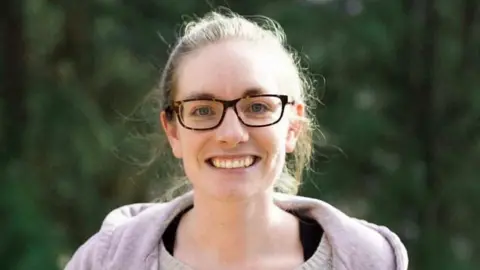 Rachel Carlson
Rachel CarlsonA woman who has had five miscarriages in three years says the psychological impact is "not to be underestimated" and she thinks she is suffering from trauma.
It has been a very difficult journey, Rachel Carlson says, for her and her husband Jonathan, who are both 34 and from County Down.
At times she says, she feels she is "falling apart".
While it is painful for her to talk about her experience she is doing so to help others.
Researchers have found infertility-related trauma may be more prevalent than previously thought, with 60% of women saying aspects of the care they received caused or amplified trauma.
Rachel has not been officially diagnosed with miscarriage-related post-traumatic stress disorder (PTSD) but it is estimated to affect thousands of women across the UK.
She believes changes in the health system are overdue to prevent others experiencing what she did, including having to walk through a maternity ward to access one of her appointments.
"I was furious to be made to wait in a room full of pregnant women and watch them come out of their appointments, all happy," she says.
The South Eastern Health Trust, where Rachel was treated, says it will be moving gynaecology outpatient services to a different location that will be "more sensitive to the needs of women".
The trust says it is "very mindful" that gynaecology and maternity services being situated next to each other could be distressing for people who have experienced pregnancy loss.
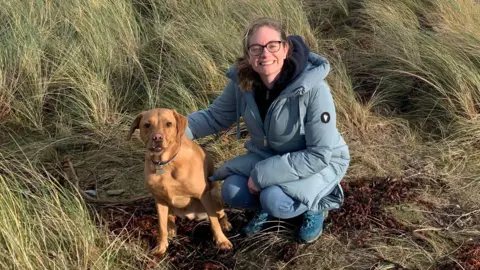 Rachel Carlson
Rachel CarlsonInfertility-related trauma
Research carried out by Fertility Network UK, Queen's University Belfast, Cardiff University and Cardiff Metropolitan University found fertility patients' experiences of trauma are compounded by poor care, and providers should be trained in trauma-informed healthcare.
According to the NHS, about one in seven couples experience difficulties conceiving a child.
Not all will experience trauma, but in the research of 590 people across the UK and Ireland, 41% met the criteria for PTSD.
It is a limited survey in terms of numbers and because the people involved have self-reported, but behind it are many other couples' stories like Rachel and Jonathan's.
Hilary Knight, NI coordinator for the charity Fertility Network UK, says the research confirms what people working in the fertility sector have long suspected - that infertility-related trauma is "very common" and is a "silent trauma within our society".
She says couples navigating infertility can find their situation is made worse by a lack of understanding of trauma or acknowledgement of their experiences as traumatic.
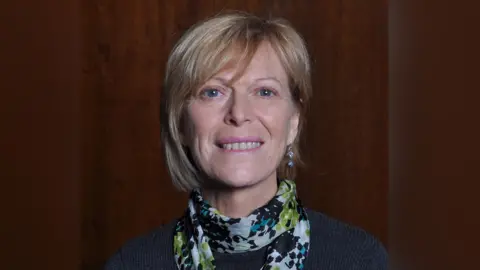 Hilary Knight
Hilary KnightWhat is PTSD?
People naturally feel afraid when in danger, but the legacy of some traumatic events is a change in perception of fear.
They may feel stressed or frightened in day-to-day life.
'Second-hand trauma'
Rachel's husband Jonathan says while the couple want to have children, they don't know how much more they can take.
"I am definitely experiencing second-hand trauma, if not my own," he says.
He remembers the scan where the couple found out about the third of their five miscarriages as "probably the most difficult".
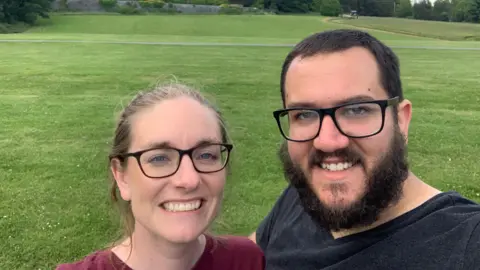 Rachel Carlson
Rachel CarlsonWhen they saw there was no heartbeat, they "ended up just crying in the car afterwards for an hour".
The couple have not yet decided where their journey goes next but Rachel said she was not "quite ready to give up".
Dealing with pregnancy loss grief
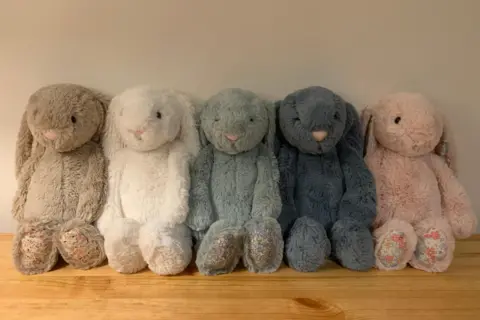 Rachel Carlson
Rachel CarlsonRachel has tried various things to try and "connect with her grief". Nothing worked, she says, until she saw some stuffed bunnies in a shop.
She "teared up" thinking she would never have a baby to buy one for so she bought one for herself.
The five bunnies sit side by side on the mantelpiece over the open fire in her living room, representing each of the five babies she lost.
They're sensory objects which mean so much and are "very comforting," she says.
She recently got a tattoo of the word "courage" on her right arm.
The tattoo "reminds me of who I am," she says determinedly - "courageous, strong and brave".
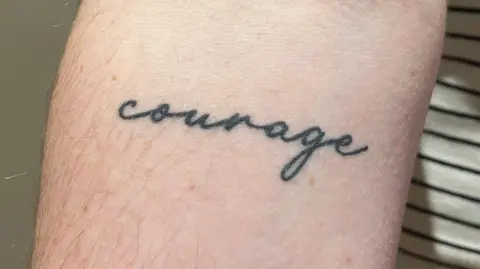 Rachel Carlson
Rachel CarlsonIf you have been affected by the issues raised in this story you can visit the BBC Action Line for support.
